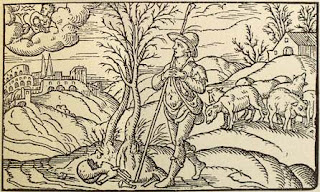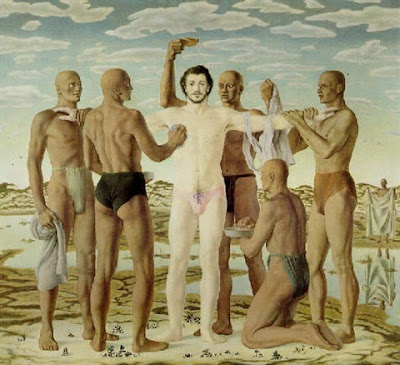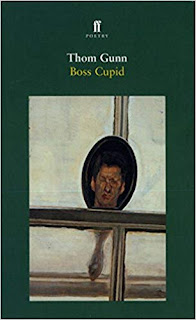Robert Duncan: Centenary
2019 was the centenary of
Robert Duncan’s birth. Born on January 7th, as a mid-Capricorn,
Duncan (a committed Hermeticist) would have heard instant rhymes between his birth
and the life to come. Capricorn is shaped after the Sumarian god, Enki. He was
the god of intelligence, the “ear” of the Universe. Duncan was to become a poet
with a refined ear, developing a complex, open-field poetry, with a visual
layout that indicated the voice’s music, the timing of sound, silence, and
breath. Being ruled by Saturn, the Capricornian personality is driven by the
darker parts of the psyche. This dominates much of Duncan’s poetry, giving it
range and melancholic depth. The tone is heard clearly in “Heavenly City,
Earthly City (1947) and “Berkeley Poems” (1966):
The heart in the darkness of the city sings.
Among my friends, love is a great sorrow,
It has become a daily burden, a feast,
A gluttony for fools, a heart’s famine.
Often, this saturnine
spirit has been attributed solely to Duncan’s homosexuality. Certainly, there
is a basis for that. In his daring self-outing in “The Homosexual in Society”,
Duncan was scathing about the levity he found in the gay lifestyle:
… one found that the group language did not allow for any feeling at all other than this self-ridicule, this “gaiety” (it is significant that the homosexual’s word for his own kind is “gay).
But behind “the love that is a great sorrow” and the “feast”
that cannot be enjoyed, is the myth of Tiresias, the poet as prophet, someone who could not enjoy a daily meal because his
cornucopia of plenty (another Capricorn image) was snatched away by the
Harpies.
At the opening of The H.D. Book, Duncan’s masterwork on
poetry— by way of a sustained meditation on the Hermeticism of H.D.—
Duncan laments the point at which literary education, if not all education,
took the wrong path: it is the point at which “self-improvement” replaced
“self-knowledge.” That is a truly saturnine perception, a person might bring
Milton’s Il Penseroso to mind: a mind turned to a gloomy Muse and the darkness
of the cosmos. Rather than encourage students to venture inwards, like an
alchemist, to find the vitriol/glass of vision—Visita Interiora
Terrae Rectificando
Invenies Occultum Lapidem— teachers have turned to an outward reality, simply
improving an individual for society’s needs.
The
image of poet-mentor casts a long shadow over Duncan’s work. And
it is the weight of this, rather than his homosexuality, that accounts for the
melancholy bass throughout his work. The darkness heard in the early poems expands
through Duncan’s open sequence of Passages:
None will raise his eyes to the stars
at night
Nor take thought if his life light
years and the outer reaches
of Heaven before he was;
(Passages 17).
Translating
from the Hermetica, “The Asklepios”, Duncan envisages the greatest
sadness—being an orphan among the stars.
But
set against this darkness is another element of Capricorn: a capriciousness, a
tendency to turn, to follow the turnings of poetry, and make the leap from
earth to heaven, from dark to light— black ecstasy. Following Agrippa (and
Milton), Duncan recognises a divine melancholy in which the fires of vision
burn in the name of Love: this is the dark solar solstice, the cosmic
turning point, which occurs in Capricorn.
Under
the lemon tree
as I drowsed on the sun, I heard,
Lucifer’s
Song in Love of His Lord,
fiery essence, the black desolation
ascending
thru the created hierarchies
into
the light of the Beloved.
("Out of the Black").
At
the close of Groundwork II, “In the Dark”, his final volume, Duncan returns to
a haunting image of Dr John Dee, who was Elizabeth I’s mathematician, astrologer,
and architect of Gloriana’s imperial imagination. In an obsidian mirror, a
black stone, Dee conversed with angels. And Duncan remembers this:
… The magic
has always been there, the magnetic purr
run
over me, the feel as of a cat’s fur
charging
the refusal to feel. That black stone,
now
I see, has its electric familiar.
Out
of blackness, the energies of magnetic obsidian, comes an energy that defeats ennui or acidia. It is deeply appropriate that Duncan’s work closes with a tribute to
Pound, who began Duncan’s lifelong journey into open form— in “That black
stone”, Pound’s rose in the steel dust, a metaphor for the energy of the Image,
is recast.
Duncan
remains one of the most vital poets: and his contribution to “gay” poetics
should never be forgotten.





Comments